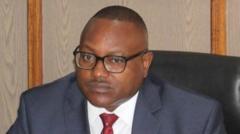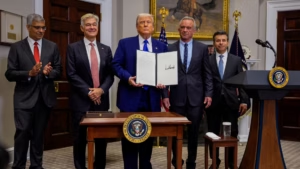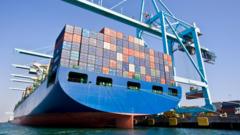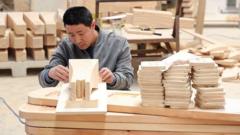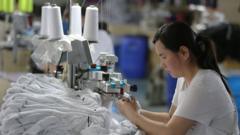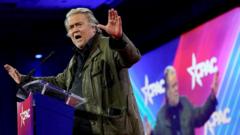Carney's newly appointed cabinet features key ministers tasked with addressing the strained US-Canada relationship and internal trade barriers, promising impactful changes during a critical moment for the Canadian economy.
Carney's Economic Cabinet Launches Amid US Trade Tensions

Carney's Economic Cabinet Launches Amid US Trade Tensions
Canadian Prime Minister Mark Carney activates a reshuffled cabinet to tackle economic challenges amid ongoing trade disputes with the US.
Canadian Prime Minister Mark Carney has officially introduced a revamped cabinet focused on economic initiatives at a time of increasing trade tension with the United States. In light of President Donald Trump's challenging remarks regarding Canada's sovereignty, Carney's new team, comprising 28 ministers and 10 secretaries of state, aims to implement "decisive action" on a comprehensive economic agenda.
This cabinet reshuffle, occurring two weeks after the electoral victory, features a blend of seasoned politicians and fresh faces designed to navigate the current trade war effectively. At the briefing following the announcement, Carney stated, "Canada's new ministry is built to deliver the change Canadians want and deserve," emphasizing the urgency of the moment.
In an effort to mend and manage relations with the US, Carney has appointed a new foreign minister, Anita Anand, who previously held significant roles in the administration of former Prime Minister Justin Trudeau. The cabinet also sees veteran MP Dominic LeBlanc transition to focus specifically on Canada-US trade and internal barriers—issues highlighted during Carney's recent dialogue with Trump, who expressed openness to negotiating a new trade deal.
The cabinet has given a new direction to several key positions: former justice minister Gary Anandasangaree has shifted to oversee public safety, a department central to Trump's advocacy for border security measures, while Toronto-area MP Maninder Sidhu has taken the helm at international trade. Melanie Joly’s removals from foreign affairs position her at the industry portfolio, reflecting a strategy aimed at reshaping Canada's approach to trade and economic policy.
The cabinet includes noteworthy holdovers like Finance Minister Francois-Philippe Champagne and Deputy Prime Minister Chrystia Freeland, maintaining continuity in pivotal roles. Furthermore, the new team brings representation from across Canada, addressing regional concerns, especially in western provinces increasingly vocal about separation.
In a nod to diversity and gender equity, Carney retains Trudeau's commitment to gender parity within the cabinet. Fresh appointments, such as former broadcaster Evan Solomon as Minister of Artificial Intelligence and Digital Innovation, highlight a focus on technology and digital economy strategies.
However, Carney faces criticism from Conservative leader Pierre Poilievre for retaining numerous ministers associated with the previous administration, arguing that this does not align with the transformative change promised in Carney's campaign.


